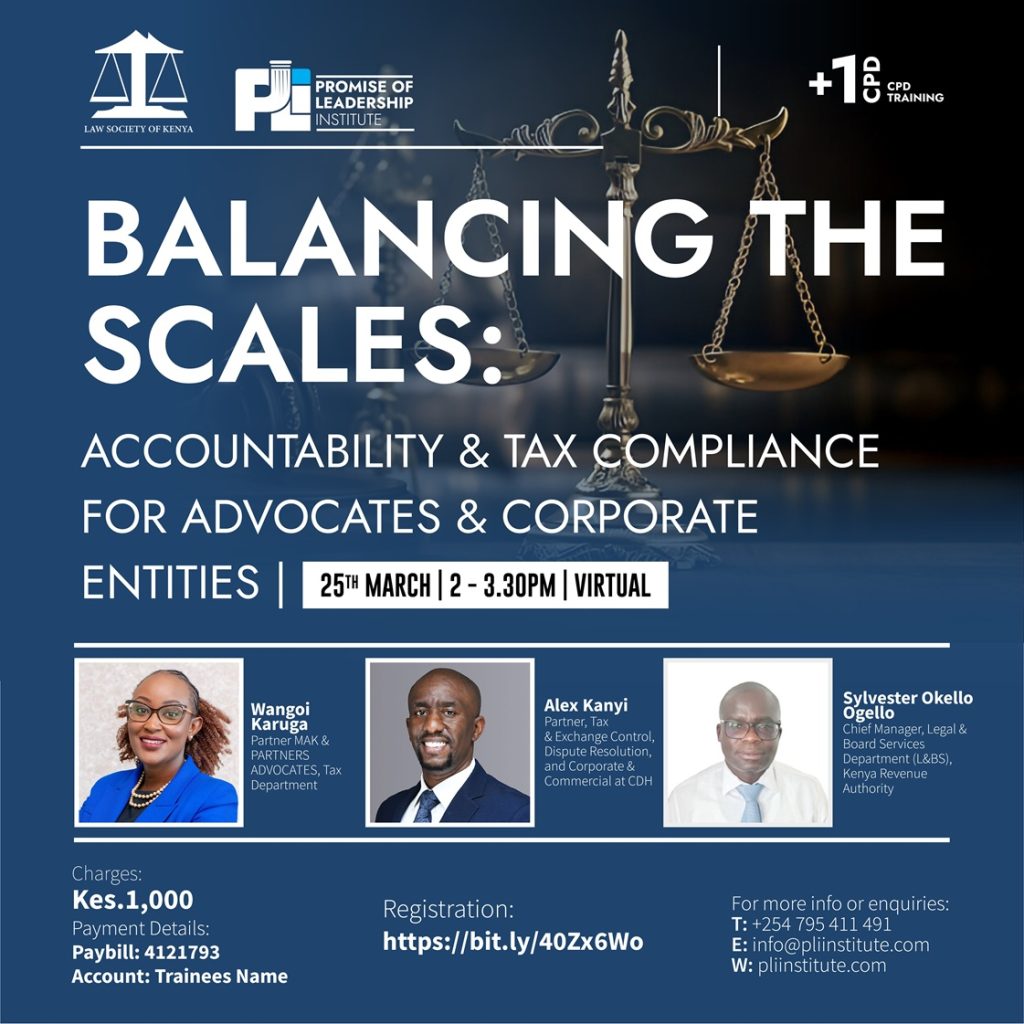The recent PLI Accountability & Tax Compliance Webinar, held on March 25, 2025, provided valuable insights into tax compliance, PIN quarantining, record-keeping for legal practitioners, dispute resolution, and the implementation of eTIMS. The session featured key industry experts, including Alex Kanyi, Sylvester Okello, and Wangoi Karuga, who shared their expertise on critical tax matters affecting law firms and businesses in Kenya.
Key Takeaways from the Webinar
1. PIN Quarantining and Taxpayer Compliance
Sylvester Okello provided a comprehensive breakdown of the PIN quarantining process, explaining that the Kenya Revenue Authority (KRA) imposes PIN quarantining on taxpayers who file returns but fail to remit taxes. This measure is designed to prevent fraudulent transactions and protect taxpayers.
He also elaborated on the role of withholding tax as a tax collection tool, highlighting its different rates for resident and non-resident payments. Wangoi Karuga raised concerns about common pitfalls that legal practitioners face in tax compliance. In response, Alex Kanyi emphasized that lack of awareness is a significant challenge, with many lawyers establishing their practices without a clear understanding of tax obligations. He urged legal professionals to seek professional guidance, noting that ignorance is not a defense in tax matters.
2. The Importance of Proper Record-Keeping for Lawyers
Wangoi Karuga stressed the critical role of proper financial record-keeping, particularly for lawyers. She underscored the need to:
✅ Separate client funds from personal accounts
✅ Differentiate between business and personal expenses
✅ Maintain proper documentation to support tax filings and claims
Sylvester Okello expanded on KRA’s commitment to ensuring accountability and tax compliance, emphasizing ongoing stakeholder engagements and its representation to the National Treasury. He acknowledged the challenges of tax policy implementation and the necessity for clarity in the taxation system.
3. The Data Management and Reporting System (DMRS) and Tax Compliance
Sylvester Okello introduced the Data Management and Reporting System (DMRS), explaining its purpose in:
✔️ Simplifying tax processes
✔️ Enhancing compliance
✔️ Broadening the tax base
He reassured participants that DMRS does not access specific transaction details beyond amounts and recipients. He also addressed data security concerns, affirming that the system undergoes regular audits by the Data Commissioner and requires only essential financial information for tax collection.
4. KRA Audit Process and Dispute Resolution Framework
The discussion covered the various notices and audit processes initiated by KRA. Sylvester Okello detailed the three stages of tax audits:
1️⃣ Desk Audit – An initial review of submitted tax documents
2️⃣ Field Audit – A more detailed investigation involving direct business inquiries
3️⃣ Tax Assessment – The final stage where KRA issues a tax obligation determination
Wangoi Karuga provided insights into the tax dispute resolution framework, emphasizing the importance of responding to tax assessments rather than ignoring them. She outlined the steps for taxpayers when contesting assessments:
🟢 30 Days – Time allowed for taxpayers to lodge an objection to an assessment
🟢 60 Days – KRA’s review period to accept or reject the objection
🟢 30 Days – If the objection is denied, the taxpayer can appeal to the Tax Appeals Tribunal
She encouraged proper preparation of appeal documents to strengthen legal standing, warning that rushed objections often lack necessary supporting evidence. She also highlighted alternative dispute resolution (ADR) as an avenue to settle tax disputes efficiently.
5. Bank Account Freezing and High Court Appeals
A critical issue raised was the freezing of bank accounts due to tax-related disputes. Wangoi Karuga outlined three primary scenarios where this may occur:
🔴 Failure to respond to an assessment notice
🔴 Involvement of a foreign company in tax matters
🔴 A ruling in KRA’s favor by the Tax Appeals Tribunal
She advised taxpayers to seek immediate legal assistance if facing such issues, emphasizing that agency notices can be challenged before the Tax Appeals Tribunal.
6. Tax Procedures and Balancing Government and Taxpayer Interests
Sylvester Okello emphasized the evolution of Kenya’s tax environment, with an increasing shift in court rulings favoring taxpayer rights. He noted the protective role of the Tax Procedures Act, which prevents immediate enforcement of tax recovery while an appeal is pending.
He also cautioned against technical loopholes in tax disputes, which can delay resolutions. Instead, he advocated for a merit-based approach in tax cases, ensuring fairness and clarity for taxpayers.
7. eTIMS Compliance and Enforcement
A major focus of the webinar was the Electronic Tax Invoice Management System (eTIMS), which is reshaping tax compliance in Kenya. Sylvester Okello highlighted KRA’s enforcement strategies:
🔵 Third-party enforcement – Encouraging larger entities to push compliance down the supply chain
🔵 Reverse invoicing for small businesses – Ensuring they adhere to eTIMS regulations
🔵 Regular compliance checks – Targeting businesses that fail to issue valid electronic tax invoices
He also reiterated the importance of anonymous reporting, encouraging legal practitioners to report non-compliant businesses via KRA’s confidential reporting channels.
Next Steps: Ensuring Tax Compliance for Lawyers
To enhance compliance and minimize tax risks, the speakers recommended the following:
✔️ Maintain accurate financial records to support all business transactions and expenses.
✔️ File tax returns and make timely payments to avoid penalties and interest.
✔️ Understand applicable tax laws to ensure compliance with professional obligations.
✔️ Engage tax professionals or accountants for expert guidance.
✔️ Separate business and personal expenses to maintain financial clarity.
✔️ Seek clarification from KRA when faced with audits or tax assessments.
✔️ Stay informed on tax laws and dispute resolution to better advise clients.
✔️ Report non-compliant businesses that fail to issue eTIMS receipts.
Conclusion
The webinar provided a comprehensive overview of tax compliance for legal practitioners, highlighting the importance of record-keeping, dispute resolution, and adapting to eTIMS requirements. Alex Kanyi, Sylvester Okello, and Wangoi Karuga offered practical insights into how businesses can navigate tax challenges while minimizing risks.
Lawyers and businesses must embrace proactive compliance strategies to avoid legal disputes and penalties, ensuring a smooth and transparent tax process.
🔗 Stay engaged with PLI for future webinars and updates on legal and financial best practices!



